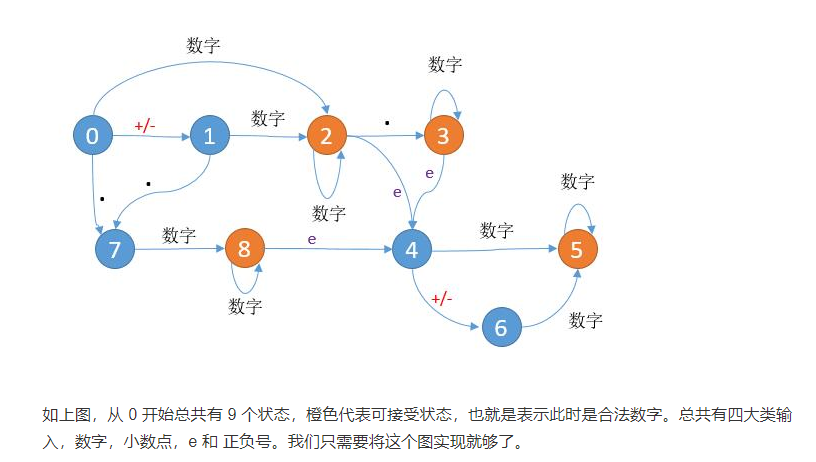Validate if a given string can be interpreted as a decimal number.
Some examples:"0" => true" 0.1 " => true"abc" => false"1 a" => false"2e10" => true" -90e3 " => true" 1e" => false"e3" => false" 6e-1" => true" 99e2.5 " => false"53.5e93" => true" --6 " => false"-+3" => false"95a54e53" => false
Note: It is intended for the problem statement to be ambiguous. You should gather all requirements up front before implementing one. However, here is a list of characters that can be in a valid decimal number:
- Numbers 0-9
- Exponent - "e"
- Positive/negative sign - "+"/"-"
- Decimal point - "."
Of course, the context of these characters also matters in the input.
Update (2015-02-10):
The signature of the C++ function had been updated. If you still see your function signature accepts a const char * argument, please click the reload button to reset your code definition.

class Solution { public boolean isNumber(String s) { int state = 0; s = s.trim();//去除头尾的空格 //遍历所有字符,当做输入 for (int i = 0; i < s.length(); i++) { switch (s.charAt(i)) { //输入正负号 case '+': case '-': if (state == 0) { state = 1; } else if (state == 4) { state = 6; } else { return false; } break; //输入数字 case '0': case '1': case '2': case '3': case '4': case '5': case '6': case '7': case '8': case '9': //根据当前状态去跳转 switch (state) {//这块是state,是integer,不是char case 0: case 1: case 2: state = 2; break; case 3: state = 3; break; case 4: case 5: case 6: state = 5; break; case 7: state = 8; break; case 8: state = 8; break; default: return false; } break; //小数点 case '.': switch (state) { case 0: case 1: state = 7; break; case 2: state = 3; break; default: return false; } break; //e case 'e': switch (state) { case 2: case 3: case 8: state = 4; break; default: return false; } break; default: return false; } } //橙色部分的状态代表合法数字 return state == 2 || state == 3 || state == 5 || state == 8; } }